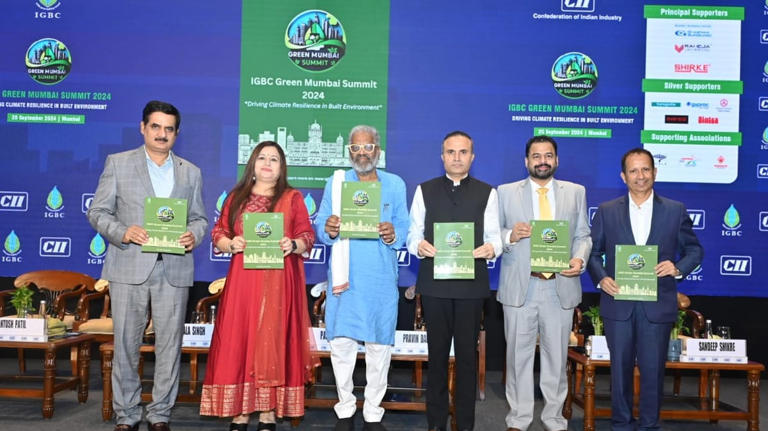The CII-IGBC (Indian Green Building Council) hosted the Mumbai Green Summit on Friday, highlighting the urgent need to tackle climate change and its impacts on coastal cities like Mumbai. The event, attended by notable figures such as Pasha Patel, Executive Chairman of the Chief Minister’s Environmental Task Force, and Pravin Darade, Principal Secretary of Environment, Forests & Climate Change, focused on climate resilience and sustainable infrastructure.
Inaugural Highlights:
- Pasha Patel emphasized the severe risks Mumbai faces from global warming and rising sea levels. He urged for timely, corrective measures, including increased bamboo cultivation, which can play a role in mitigating climate change. Patel also discussed using green steel in construction to promote eco-friendly building practices.
- Pravin Darade spoke about Mumbaikars’ reliance on public transport and expressed optimism that the expanding metro network would further reduce the city’s carbon footprint. He reiterated the importance of bamboo planting to combat environmental degradation.
CII’s Vision for Mumbai’s Future:
- Vishal Kamat, Chairman of the CII Maharashtra State Council, emphasized the role of CII as a key player in shaping a climate-resilient future for Mumbai. He underscored the city’s vulnerability to rising sea levels, heatwaves, and urban flooding, and advocated for resilient infrastructure. Kamat highlighted CII’s commitment to working with the government and civil society to address these unique challenges through sustainable urban growth.
Key Initiatives:
- The summit marked the release of the “Green Dossier,” showcasing CII IGBC’s extensive work in promoting green building practices across India. With over 14,400 certified projects covering 12.02 billion sq ft, the IGBC is at the forefront of sustainable development in the country. In Maharashtra, over 3,000 projects spanning 3.53 billion sq ft have been certified, with Mumbai contributing 1,540 projects covering 1.72 billion sq ft.
Technical Discussions:
Two key technical sessions explored:
- Economic Benefits of Sustainability – This session looked at how adopting sustainable practices can benefit real estate developers and contribute to healthier living and working environments, prioritizing human well-being.
- Strategies for a Low Carbon Built Environment – The discussion focused on sustainable design, eco-friendly products, and technologies required to achieve a low-carbon footprint in construction.
The summit marked a significant step towards Mumbai’s journey in addressing climate change, fostering collaboration between the government, industry, and civil society to build a sustainable future.

